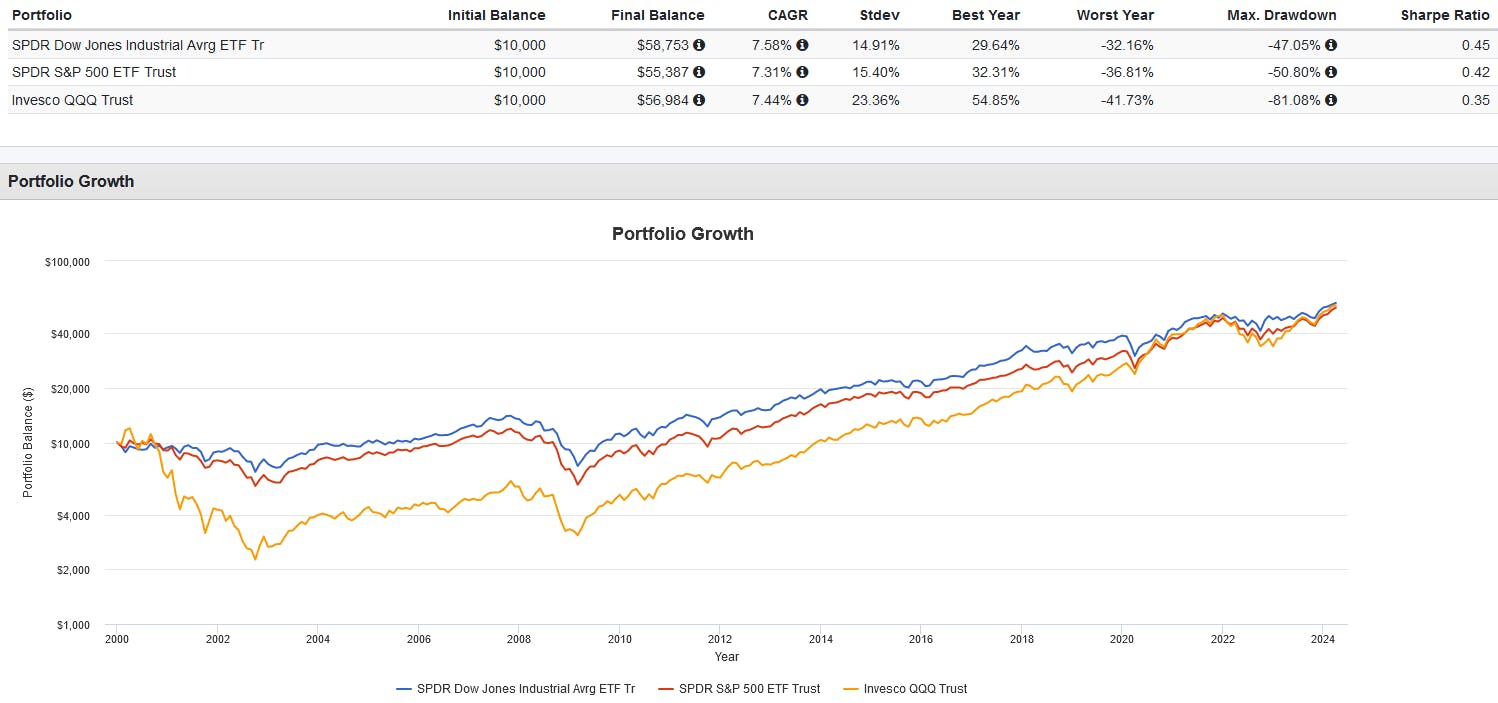Despite its venerable age, the Dow Jones Industrial Average (DJIA) remains a cornerstone of financial market benchmarks, frequently cited alongside the S&P 500 and Nasdaq-100 as a measure of U.S. market performance.
This enduring relevance persists despite several critiques leveled against the DJIA, including the subjective selection of its components by a committee from The Wall Street Journal, its price-weighted (rather than market cap-weighted) structure, its exclusion of utilities, and its concentration on only 30 holdings.
However, the adaptability and performance of these 30 blue-chip companies have demonstrated resilience and competitive returns over time. Remarkably, the DJIA has shown a capacity to outperform both the S&P 500 and the Nasdaq-100 from 1999 to the present.

This success can primarily be attributed to the defensive posture of its value-oriented blue chips during tumultuous periods, such as the Dot-com bubble and the 2008 financial crisis.
For investors looking to gain exposure to this iconic index, here are three ETF options that allow you to invest in the DJIA today, each offering a unique approach to capturing the essence and performance of these 30 blue-chip companies.
Plain vanilla exposure
For investors seeking straightforward exposure to the DJIA, minus the expense ratio, the SPDR Dow Jones Industrial Average ETF Trust (NYSE:DIA) (DIA-0.14%) is the quintessential choice.
Launched in January 1998, DIA stands as one of the largest equity ETFs in the U.S., boasting an impressive $33 billion in assets under management.
With a modest expense ratio of 0.16%, DIA offers a direct replication of the Dow's composition, allowing investors to closely mirror the performance of the 30 blue-chip companies that define the index.
This ETF is noted for its exceptional liquidity, evidenced by a 0.01% 30-day median bid-ask spread, making it an attractive option for both individual and institutional investors.
Additionally, DIA provides monthly distributions, featuring a 30-day SEC yield of 1.69%, enhancing its appeal for income-seeking investors. The availability of an options chain further adds to its versatility, offering various strategies for investors to hedge, speculate, or generate income.
Dividend focused exposure
The "Dogs of the Dow" is an old-fashioned investment strategy that harks back to traditional stock-picking methods. The approach involves selecting the top 10 highest-yielding stocks within the DJIA at the start of each year.
The rationale behind this strategy is twofold: it aims to capture attractive income through dividends and suggests that these high-yield blue-chip stocks might be undervalued relative to their counterparts in the index, potentially signaling a buying opportunity.
In the current investment landscape, you can engage with a modern take on this strategy through the Invesco Dow Jones Industrial Average Dividend ETF (NYSE:DJD-0.25%).
DJD follows the Dow Jones Industrial Average Yield Weighted Index, which includes only those DJIA companies that pay dividends. However, unlike the traditional DJIA that weights components by price, DJD weights its holdings based on their 12-month dividend yield over the preceding 12 months.
This ETF not only provides a focused way to invest in dividend-paying blue chips from the Dow but does so with a lower expense ratio than DIA, at just 0.07%. Additionally, DJD offers a more attractive income component, boasting a 30-day SEC yield of 3.31%.
Equal-weighted exposure
The price-weighted methodology employed by the Dow Jones Industrial Average is a remnant from earlier times when the index had to be straightforward enough to be calculated with pen and paper at the end of the trading day, using its divisor.
In today's era of advanced indexing techniques, market cap weighting has become both simple to implement and cost-effective, offering a more proportional representation of the market.
For those who find the price weighting of the Dow less appealing, the First Trust Dow 30 Equal Weight ETF (EDOW+0.48%) presents an attractive alternative.
True to its name, EDOW equalizes the weight of all 30 DJIA stocks, allocating approximately 3.33% to each component upon its quarterly rebalancing.
This approach provides a more balanced perspective of the index, potentially offering advantages to investors seeking a diversified yet focused portfolio of mega-cap stocks.
However, this equal-weight strategy comes with its set of trade-offs, including a higher turnover rate and a steeper expense ratio of 0.50%.
Despite these costs, EDOW might be particularly appealing to those investors looking for an equitable representation of the Dow's constituents, diverging from the traditional price-weighted scheme and potentially mitigating the outsized influence of the index's highest-priced stocks.
This content was originally published by our partners at ETF Central.
